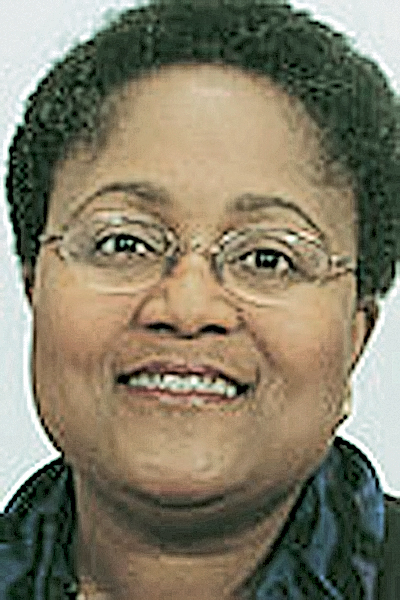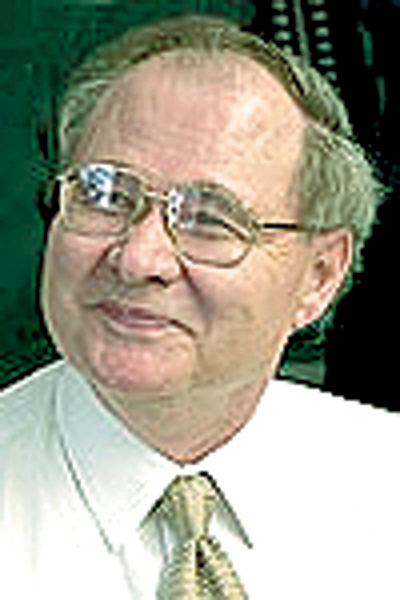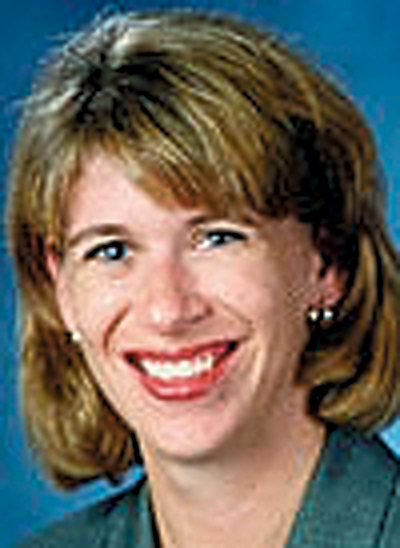10 movers and shakers at KU

From left to right, Lindy Eakin, Denise Stephens, Dennis Moss, and Ralph Oliver.

Lindy Eakin, left, vice provost for administration and finance at Kansas University, runs with members of the KU
If you take a glance at Kansas University’s organizational chart, you’ll see a lot of people with a lot of big titles. There are dozens of department heads, vice provosts and directors whose names rarely make headlines. Here are some of the under-the-radar people who contribute to the workings of the campus on a day-to-day basis.
1. Lindy Eakin
Vice provost for administration and finance
Lindy Eakin said he can be thought of as the “money guy” inside Strong Hall. If there’s a building that needs to be built or a costly new program to be implemented, Eakin weighs in on how the financing could be structured and what money needs to be moved where.
“I think of myself as sort of the central banker,” he said.
One example is the recent plan approved by the Legislature to spend $26 million in coming years on improvements to KU buildings. Eakin said it may make sense, once a building is being torn up, to do additional projects that aren’t paid for through the state “deferred maintenance” funding. He’ll be reminding deans and directors to keep an eye out for those kinds of opportunities.
Eakin also has been involved in structuring the finances of KU’s five-year plan to increase tuition and hire 100 new faculty members, as well as implementing a plan originally requested by student leaders: finding a way to make tuition “guaranteed” for all four years that a student is at KU.
Eakin, shown at left, can be spotted regularly running through downtown with the “KU Mad Dogs.”
2. Denise Stephens

Denise Stephens
Vice provost for information technology
Denise Stephens, who has an office on the second floor of Strong Hall, started her career as a librarian working at a reference desk. As technology changed, she adjusted her interests, as all librarians have had to do. Today, she is KU’s Chief Information Officer and is in charge of the big-picture information technology decisions that need to be made on campus.
“At the center of the mission is the information,” said Stephens, who was head of KU’s Anschutz Library until 2002, left for Syracuse University, and came back to KU in 2005.
Stephens said she has three main priorities: creating a secure computer network and applications, supporting the research environment through information technology- for example, by working toward connecting KU with a high-powered network called the National LambdaRail – and trying to position KU so that it is in front of technological change.
“We want to say, ‘Where’s the future going?'” Stephens said.
3. Dennis Moss

Dennis Moss
University auditor
Dennis Moss, whose office is on the third floor of Strong Hall, reports directly to Chancellor Robert Hemenway. His job is to investigate fraud allegations and evaluate university programs and activities.
His office puts on a presentation in an orientation for new managers twice per year, reminding them to have controls such as keeping copies of deposit slips and not giving one person sole oversight of a process.
“Often times people have this idea that controls are only there because we don’t trust people. You hear this all the time- ‘You don’t trust me’ – and people don’t like feeling that they’re not trusted,” Moss said. “The point I always make to management is that we don’t have controls because we don’t trust people. We have controls because that’s the way you as the manager make sure that what you want to happen happens.”
4. Ralph Oliver

Ralph Oliver
Chief of public safety
Ralph Oliver has ties to KU that reach far beyond his current title.
The Kansas City, Kan., native was the first police officer hired by Kansas University Hospital when it created its own police force. Oliver had been working as a parole officer at Rainbow Mental Health Facility in Kansas City and jumped at the idea of becoming a law enforcement officer.
“That’s what started the relationship with the University of Kansas,” Oliver said, smiling. “Even though I was born at KU Med Center, I’ve always had that connection.”
Oliver has been with the KU Office of Public Safety since 1984 and has been its director for the past 10 years. At KU he has worked large demonstrations such as the anti-apartheid protests in the late 1980s and helped with incidents such as the March 2006 microburst that damaged 70 buildings on campus.
“We were very fortunate there weren’t any injuries or fires or gas leaks or anything like that so we could immediately turn our attention to recovery,” said Oliver, who oversees the department’s 26 employees and its own 911 call center.
Oliver said he takes the safety of KU students and staff seriously. He will have an especially vested interest in campus security this fall as his daughter will be a freshman.
5. Lisa Pinamonti Kress

Lisa Pinamonti Kress
Director of admissions and scholarships
Lisa Pinamonti Kress, who has an office in the KU Visitor Center near 15th and Iowa streets, oversees a staff of 30-plus full-time staff members and dozens more student workers and volunteers. The office is in charge of everything it takes to bring students to KU: publications such as the viewbook, mailing lists, recruiting visits to high schools, allocation of scholarships, applications and student visits to campus.
“We feel that if we can get you here, we can sell you on the university,” Kress said.
As early as sixth grade, students may be added to the office’s mailing list and start receiving postcards asking whether they’ve thought about attending college.
The job isn’t just about promoting KU and seeing who enrolls. Kress said that gathering and evaluating data about incoming classes is becoming more and more important to how the office does its job.
That’s in part because KU has a set of “strategic recruitment” goals for the next decade, which include raising the student body’s ACT profile and increasing the percentage of out-of-state students and minorities
6. Joshua Rosenbloom

Joshua Rosenbloom
Associate vice provost for research
If a KU faculty member wants to make a pitch for a new research center on campus- one that will bring in millions of dollars in federal funding – he or she will probably come into contact with Joshua Rosenbloom.
Rosenbloom’s duties as associate vice provost for research include overseeing KU’s “Major Project Planning Grant,” which has an annual budget of $300,000 to help faculty prepare their proposals for big-time research grants. He also oversees KU’s general research fund, which awards money to faculty on a competitive basis, and a program that gives all new tenure-track faculty a one-time research grant.
Rosenbloom, a professor of economics who directs KU’s Center for Economic and Business Analysis, sees himself as a booster for research. It’s a subject that provost Richard Lariviere has said should be the faculty’s No. 1 priority.
“My goal is to help faculty at the university do the best research they can,” he said.
He also oversees KU’s designated research centers, along with fellow associate vice provost George Wilson, and is in charge of KU’s research-integrity practices and programs to train people to be better researchers.
7. Mary Lee Hummert

Mary Lee Hummert, KU associate vice provost.
Vice provost for faculty support
Mary Lee Hummert, who is finishing her first year as vice provost for faculty support, is in charge of helping faculty members navigate KU’s system – whether it’s through overseeing new-faculty orientation, implementing new policies, working with the Center for Teaching Excellence, or helping train new department heads for their administrative roles.
“It’s really thinking about the needs of our faculty in the classroom and in the lab or library or wherever they do their research,” she said. “We want our faculty to be successful on all levels.”
If there’s a new category of faculty appointment that a department or school needs to create- for example, this year KU added a “clinical professor” faculty track – it lands in Hummert’s lap.
She’s also the contact within the provost’s office for the schools of fine arts, business, journalism, law and social welfare.
8. Kellie Harmon

As Kansas University’s ombudsman, Kellie Harmon is responsible for ensuring members of the university receive fair and equitable treatment. KU’s ombudsman office, which was created in 1977, is a resource for university members for matters ranging from conflicts with supervisors and instructors to policy consultation and bullying.
Ombudsman
The word “ombudsman” is a Swedish term that translates roughly to, “a person who has an ear to the people.” Kellie Harmon’s role is to listen to grievances from anyone in the campus community- faculty, students or staff – and help them resolve their problems.
She doesn’t take sides, she doesn’t keep written records of the meetings, and the process is informal.
“We’re a confidential, off-the-record resource,” she said. “We listen to anyone and everyone about everything.”
Harmon also gives what she calls “upward feedback”: alerting administrators of trends and problems she’s hearing from people who visit her office. Students often come with concerns about a grade or how a faculty member is treating them.
Harmon may go as far as conducting an investigation or may simply refer the student to another resource.
9. Nona Golledge

Nona Golledge, director of KU Dining Services.
Director of KU dining services.
Nona Golledge, who has an office in the Kansas Union, is in charge of overseeing 20 dining locations across campus, ranging in size from snack bars to Mr’s E’s, the massive dining commons for students living in the Daisy Hill dormitories. The department also does catering and runs the “training table” meal program for KU’s student athletes.
That’s about 10,000 meals per day, not including catering, which can range from a couple hundred meals per day to a couple thousand. The job also includes overseeing a database of 4,000 recipes and overseeing a staff of 600 people.
Part of the job is keeping up with trends. The department in the fall plans to roll out a “net nutrition” site in which students can calculate their calories, carbohydrates and protein of the meals they plan to eat. Another recent trend is toward more “action stations,” or places where people can watch their own meal be assembled and have a role in what’s in it.
“It’s not just about creating menus,” said Golledge, who is from Larned and graduated from Kansas State University with a degree in dietetics. “It’s become more about entertainment to our customers- providing some kind of interest to them.”
10. Doug Riat

Doug Riat, director of facilities operations at KU, supervises an operation of about 400 staff.
Director of facilities operations
Doug Riat, who has a degree in architectural engineering from Kansas State University, oversees an operation of about 400 people who keep the university clean, repair the roads, run the pipes, trim the bushes, and do about 50 to 60 remodeling jobs on campus per year.
He said the four associate directors under him make his job easy.
“They’re extremely accountable for their areas,” he said.
Riat said his job involves making strategic decisions, such as whether it would be better to replace or keep fixing expensive pieces of equipment, whether to have his staff work on a project or to have it done externally, and how to plan for utility expansions needed on campus.
“You could come to work and have three weeks that are fairly typical, then you might wake up one day and you have a microburst, like last year,” Riat said.
In coming years, his staff will be busy working on the roughly $26 million worth of projects Legislature approved this year to address a maintenance backlog on campus. For Riat, one of the challenges will be figuring out how to do the repairs of the university tunnels with minimal interruptions to the campus.







